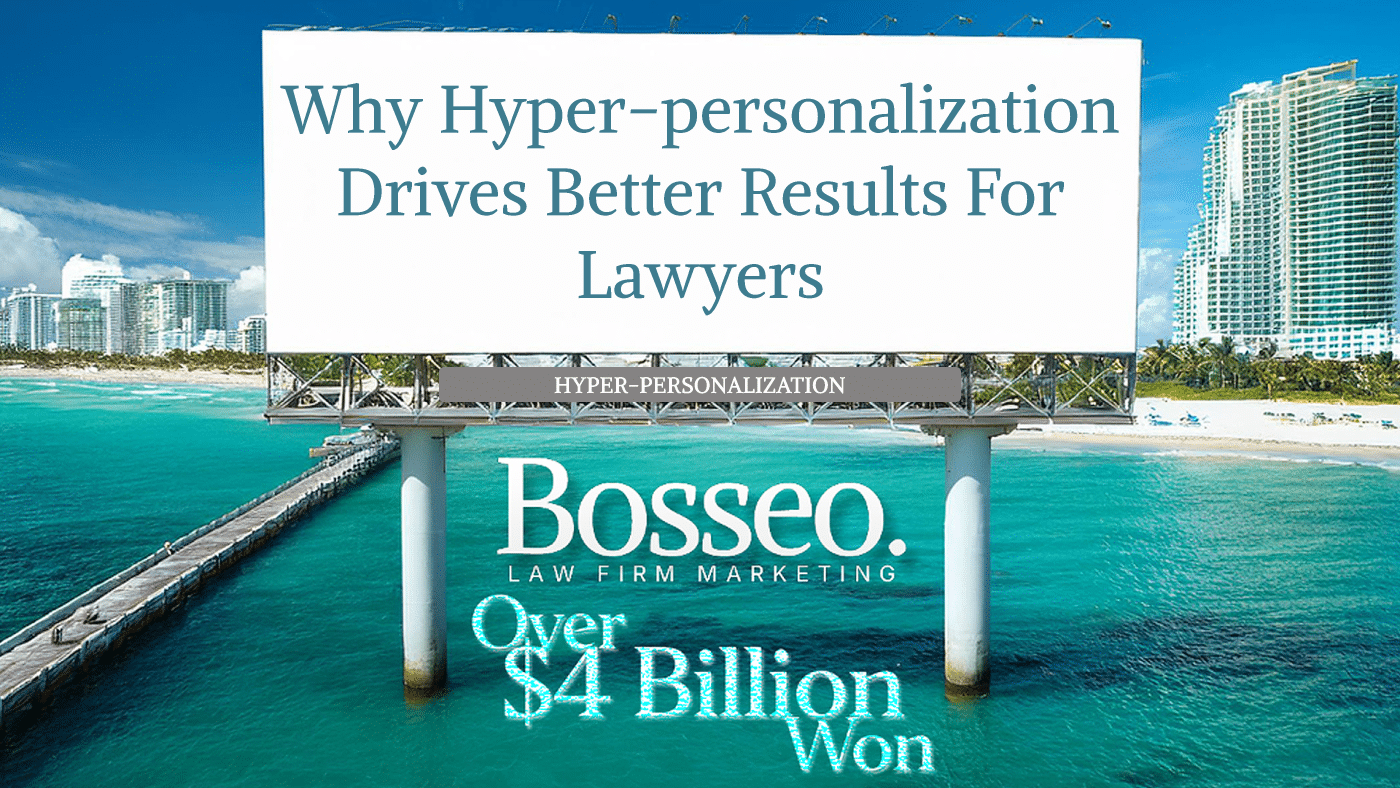## How Customization Enhances Legal Practice Success with Hyper-Personalization
In the ever-evolving legal landscape, a one-size-fits-all approach is quickly becoming outdated. Today’s clientele seeks not just legal expertise but personalized counsel that aligns with their unique needs and expectations. This is where hyper-personalization comes into play as an indispensable tool for law firms aiming to outperform competitors. By tailoring marketing strategies and service offerings to meet individual client preferences, law firms can significantly boost client satisfaction and retention rates, setting a new benchmark for success in the industry.
Hyper-personalization leverages data-driven insights to deliver customized experiences. In the legal sector, it means understanding the nuances of each client’s case and preferences, thereby offering services that resonate on a personal level. This advanced approach widens the traditional practice of customization by integrating digital technologies for more precise and impactful client interaction. Law firms that capitalize on hyper-personalization can cultivate deeper relationships, ensuring clients feel valued and understood, which translates into better results and increased word-of-mouth referrals.
For law firms keen on expanding their reach and cementing their reputation as client-focused entities, adopting hyper-personalization is not merely advantageous—it is necessary. The tailored experiences create a competitive edge that’s hard to beat, especially in a saturated market where differentiation is the key to sustained growth. As technology and data analytics become more accessible, forward-thinking law firms are poised to use these tools to enhance client engagement and satisfaction at unprecedented levels.
## Defining Hyper-Personalization in Legal Marketing
Hyper-personalization extends beyond traditional personalization by involving real-time data collection and analysis to tailor client experiences on an individual level. For law firms, this means harnessing insights from client interactions, case histories, and even predictive analytics to offer bespoke solutions and communication strategies that are uniquely aligned with individual client needs. It combines intelligent data analytics with human touchpoints, creating a sophisticated framework that responds adaptively to client behavior and preferences.
In a legal context, hyper-personalization is about more than just adapting messaging or marketing strategies according to client demographics. It’s about the holistic transformation of client relationships, where every touchpoint—be it through digital channels or in-person consultations—is informed by insights into client behavior, history, and predictive needs. This comprehensive understanding allows law firms to anticipate client needs, provide proactive solutions, and deliver unparalleled value through deeply personalized legal counsel.
Such personalized approaches can significantly differ case by case. For one client, it might mean tailored notifications and updates provided through their preferred communication channels. For another, it might involve customized legal strategies that align closely with their business goals or personal aspirations. By embedding hyper-personalization into their daily operations, law firms can ensure that their services are not only relevant but also resonate profoundly with each client’s aspirations and requirements.
## The Importance of Hyper-Personalization for Law Firms
In today’s competitive legal market, standing out as the preferred choice for potential clients is more challenging than ever. With an increasing number of choices available, clients are more discerning and seek law firms that demonstrate genuine concern for their individual needs. This is where hyper-personalization provides a differentiating factor, offering law firms a pathway to distinguish themselves through meaningful client interactions that prioritize long-term relationships over mere transactional engagements.
Client expectations have evolved with technological advancements. The digital age has ushered in an era where clients expect the same level of personalization in their legal services as they receive in sectors like retail and service industries. As clients welcome digital solutions, they also seek law firms that can offer services that are seamlessly tailored to their specific legal needs. Hyper-personalization fulfills this demand, providing an enriched client experience that engenders loyalty and fosters trust.
Moreover, embracing hyper-personalization allows law firms to glean more precise insights into client behaviors and preferences. This intelligence can be utilized to refine strategic approaches, improving decision-making and tactical planning in client engagement. By aligning their services with what clients truly value, law firms not only enhance client satisfaction but also streamline their own processes, thereby operational efficiency and amplifying outcomes.
## Establishing Context: The Framework for Hyper-Personalization in Law
Hyper-personalization is underpinned by several foundational elements crucial for law firms looking to implement it effectively. At the heart of hyper-personalization is data—the collection, interpretation, and application of client-related data to tailor services and communication. Advanced client relationship management tools are indispensable assets, providing law firms with the ability to comprehensively track, organize, and leverage data for more insightful client engagements.
Additionally, technology plays a pivotal role in facilitating hyper-personalization. The integration of AI and machine learning technologies offers law firms sophisticated methods for analyzing client data at scale. These technologies not only enable personalized marketing strategies but also offer predictive insights that can guide resource allocation, communication timing, and even legal strategy formulation. Such capabilities are essential for designing hyper-personalized experiences that are both impactful and strategic.
Law firms must also cultivate a culture of adaptability. Adopting hyper-personalization requires more than just technological upgrades—it necessitates a shift in operational mindset. Lawyers and staff must embrace a client-centric philosophy, embedding personalization into every facet of their work. Training and development programs focused on client engagement strategies and data utilization are crucial investments for law firms committed to transformation through hyper-personalization.
## Illustrative Cases: Hyper-Personalization in Law Firms
Real-world examples of hyper-personalization in the legal field illuminate its transformative potential and the breadth of its application. Renowned firms that have embraced this approach demonstrate how hyper-personalization can be woven into various aspects of legal practice, enhancing client relationships and service outcomes. These examples serve as instructive benchmarks for other law firms aspiring to enrich their service models through personalized interactions.
One notable instance involves a firm that revolutionized its client onboarding process. By utilizing data analytics to preemptively identify client preferences and concerns, the firm was able to customize its introductory sessions, providing clients with tailored legal solutions and communication plans from the onset. This approach not only improved initial client satisfaction but also aided in client retention as clients appreciated the personalized attention to their specific legal needs.
Another example includes a law firm that personalized its digital marketing strategies, targeting potential clients with ads tailored to their legal concerns and their stage in the client journey. This nuanced understanding of the client’s lifecycle enabled the firm to engage in timely communication and offer relevancy in its legal propositions, consequently leading to higher conversion rates. It showcases how hyper-personalization can enhance client acquisition and engagement through tailored interactions.
These illustrations underscore the adaptable and varied implementations of hyper-personalization within the legal industry. They provide valuable insights into how law firms can adopt personalized approaches not as mere addons but as integral to their service delivery. Ultimately, employing hyper-personalization elevates client interactions into valuable connections that foster lasting allegiance and drive firm success.
## Strategic Steps for Implementing Hyper-Personalization
The journey toward hyper-personalization within a law firm begins with strategic planning and thoughtful implementation. Firms should start by auditing existing client databases to identify trends and gather meaningful insights that can inform personalization strategies. Establishing a robust data management system is key, ensuring that data collection is streamlined and analyzed efficiently for actionable insights.
Next, developing a comprehensive client profile framework is essential. Beyond demographics, this framework should include data on client preferences, communication channels, and prior interactions. By understanding these dimensions, law firms can craft personalized communication plans and anticipate client needs, offering tailored legal counsel and timely updates that resonate with each individual client.
Integrating technology, such as CRM tools or AI-driven analytics platforms, can significantly aid in hyper-personalization efforts. These tools enable law firms to automate personalized interactions, facilitate predictive analytics, and glean richer insights into client satisfaction and behavior patterns. Training staff to effectively use these technologies is equally important, as it empowers them to enhance client engagements with personalized insights.
While these steps provide a roadmap to adopting hyper-personalization successfully, law firms should view the process as a continuous cycle of learning and adaptation. Regularly revisiting and refining personalization strategies will be necessary to keep pace with evolving client expectations and technological advancements, ensuring enduring success in delivering client-centered legal services.
## Pitfalls in Hyper-Personalization: Common Law Firm Mistakes
While the benefits of hyper-personalization are manifold, law firms must remain vigilant against pitfalls that can undermine its effectiveness. One common mistake is neglecting to strike a balance between personalization and privacy. Clients seek a personalized experience but also value their privacy; overstepping boundaries by gathering too much intrusive data can deter potential clients and risk compliance issues with data protection regulations.
Another prevalent error involves inconsistencies in data usage across communications. If a law firm establishes personalized client interactions in one area but fails to maintain this standard across all touchpoints, it can lead to client dissatisfaction and brand distrust. Consistency is paramount; all team members must ensure seamless and personalized experiences that reinforce a cohesive client journey from the initial point of contact to the resolution of legal matters.
Law firms often underestimate the importance of training their staff in the nuances of hyper-personalization strategies. Without adequate training, personnel may not know how to effectively leverage personalization tools or interpret data insights, leading to missed opportunities and suboptimal client engagement. Comprehensive training programs and ongoing education are necessary to sustain a high level of service and ensure the success of hyper-personalization initiatives.
Being aware of these common pitfalls allows law firms to better navigate the complexities of hyper-personalization. By prioritizing client privacy, ensuring consistent communications, and investing in team training, law firms can maximize the potential of hyper-personalization to create meaningful client relationships and drive firm growth.
## When to Engage a Law Firm Marketing Company
There are critical junctures when engaging a law firm marketing company can significantly enhance a firm’s hyper-personalization initiatives. Often, law firms possess the ambition to personalize services but lack the specialized resources or expertise to implement effective strategies comprehensively. When in-house capabilities are stretched thin, seeking external guidance can infuse both strategic direction and operational efficiency into personalization efforts.
A law firm marketing company can provide fresh insights, tailored strategies, and a wealth of experience in handling hyper-personalization projects across the legal industry. They bring to the table not just an understanding of advanced technologies and data analytics but also a nuanced comprehension of industry-specific challenges and client behaviors. This expertise allows them to devise strategies that are not only practical but also innovatively aligned with newer personalization trends.
Another crucial point for consultation is during the scaling of personalization initiatives. As a law firm seeks to extend its personalized services across a larger client base, coordination and implementation complexities can increase. A marketing company can streamline this expansion, ensuring that personalized experience quality remains high even as the firm grows in size and client volume. Their involvement allows law firms to focus on their core services while the marketing facets are expertly handled to support growth objectives.
Engagement with a law firm marketing company is thus advantageous at any stage where a firm requires additional insights, strategic refinement, or operational support to elevate its hyper-personalization capability. Leveraging their expertise can lead to more efficacious client interactions, enhanced satisfaction, and sustainable business growth.
## Advantages of Partnering with a Law Firm Marketing Company
Collaborating with a dedicated law firm marketing company provides numerous advantages that can transform a firm’s approach to hyper-personalization. With their extensive industry knowledge and specialized skills, marketing companies offer bespoke solutions that enhance personalization initiatives, adapting them to the specific needs and strategic goals of the law firm. This allows the law firm to focus its attention on providing premier legal services without getting bogged down by marketing complexities.
A key advantage is the ability to harness cutting-edge technologies and data analytics that a marketing company can bring to the table. They can deploy advanced tools to track client behavior and preferences, enabling a law firm to refine its services and maintain a competitive edge. This technological leverage ensures that personalization strategies are not only effective but also efficient, creating a seamless and rewarding client experience without overextending internal resources.
Moreover, a law firm marketing company can optimize communication channels, ensuring that every client interaction is purposeful and personalized. This optimization translates to enhanced client satisfaction, as clients receive timely and relevant communications that meet their specific needs. Additionally, marketing companies offer insights into emerging trends, helping law firms stay ahead of industry shifts and customer expectations, further solidifying their market position.
A collaboration with a marketing company can thus yield tangible, long-lasting benefits. It propels the firm’s hyper-personalization initiatives forward, ensuring these tailored strategies align with broader business goals and result in meaningful client engagement and increased firm growth.
## The Bosseo Advantage: Customized Solutions for Legal Success
Bosseo stands out as a leading law firm marketing company devoted to propelling its clients towards achieving unprecedented success through hyper-personalization strategies. Serving clients throughout the United States, Bosseo understands the diverse landscape of legal challenges and is proficient in creating hyper-customized marketing strategies tailored to the specific needs and objectives of each law firm it represents.
One of the central tenets that set Bosseo apart is its unwavering commitment to innovation. Bosseo utilizes the latest in data analytics, AI technologies, and market insights to craft marketing solutions that are not only customized but also anticipate future trends in the legal market. This foresight and adaptability empower law firms to remain agile in their personalization efforts, ensuring they meet client needs more effectively and efficiently than ever before.
In addition to its technological prowess, Bosseo prioritizes developing a deep understanding of each client’s unique objectives. This client-centric philosophy guides their approach in crafting marketing strategies that align perfectly with the firm’s vision and operational realities. From enhancing digital presence to refining client communication methodologies, Bosseo’s strategies are meticulously designed to support robust client relationships and fuel growth.
Choosing Bosseo means partnering with a team that is wholly invested in the success of law firms through innovative and personalized marketing solutions. By opting for Bosseo, law firms can rest assured that their hyper-personalization strategies are in expert hands, positioned for achieving favorable client outcomes and sustained competitive advantage.





